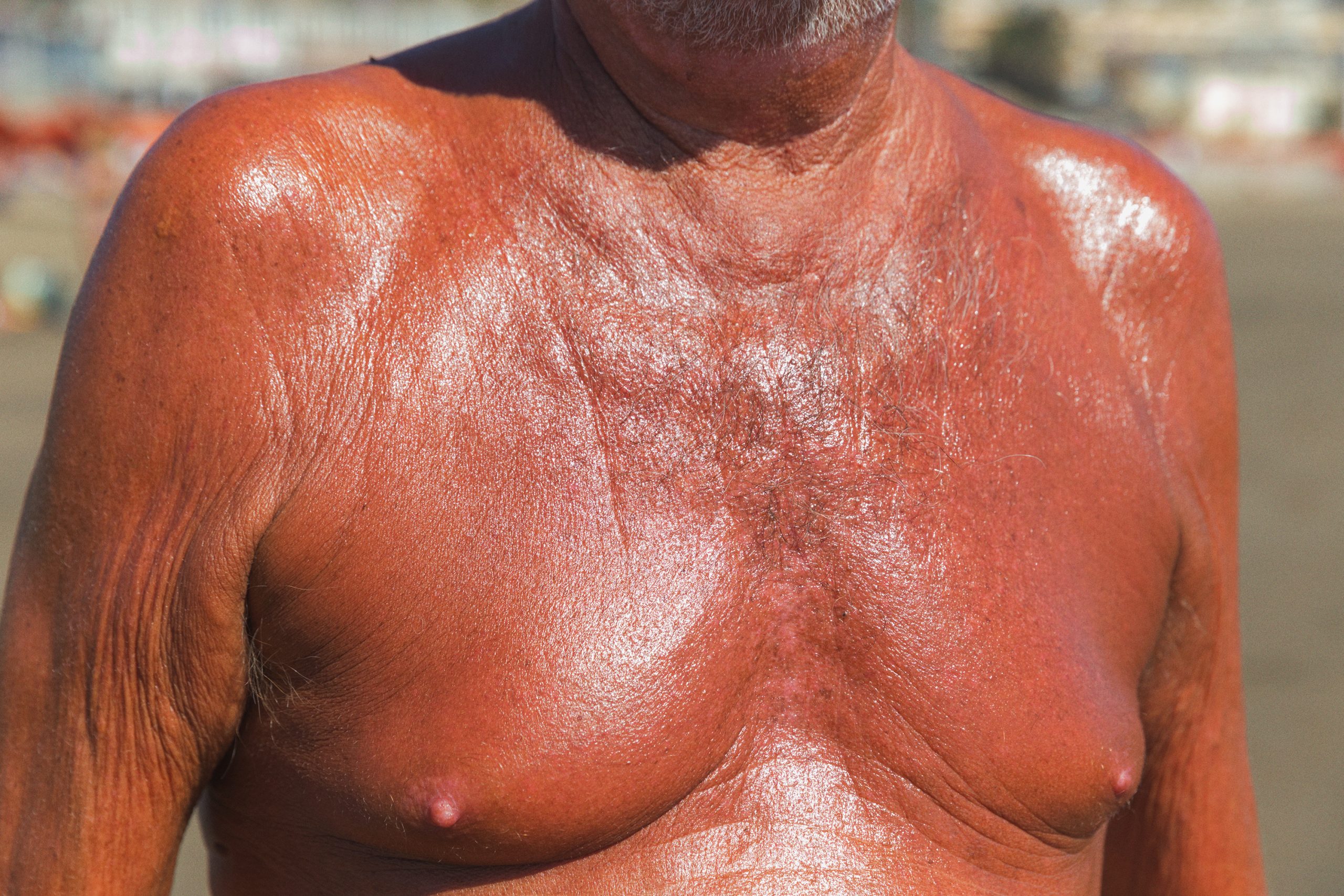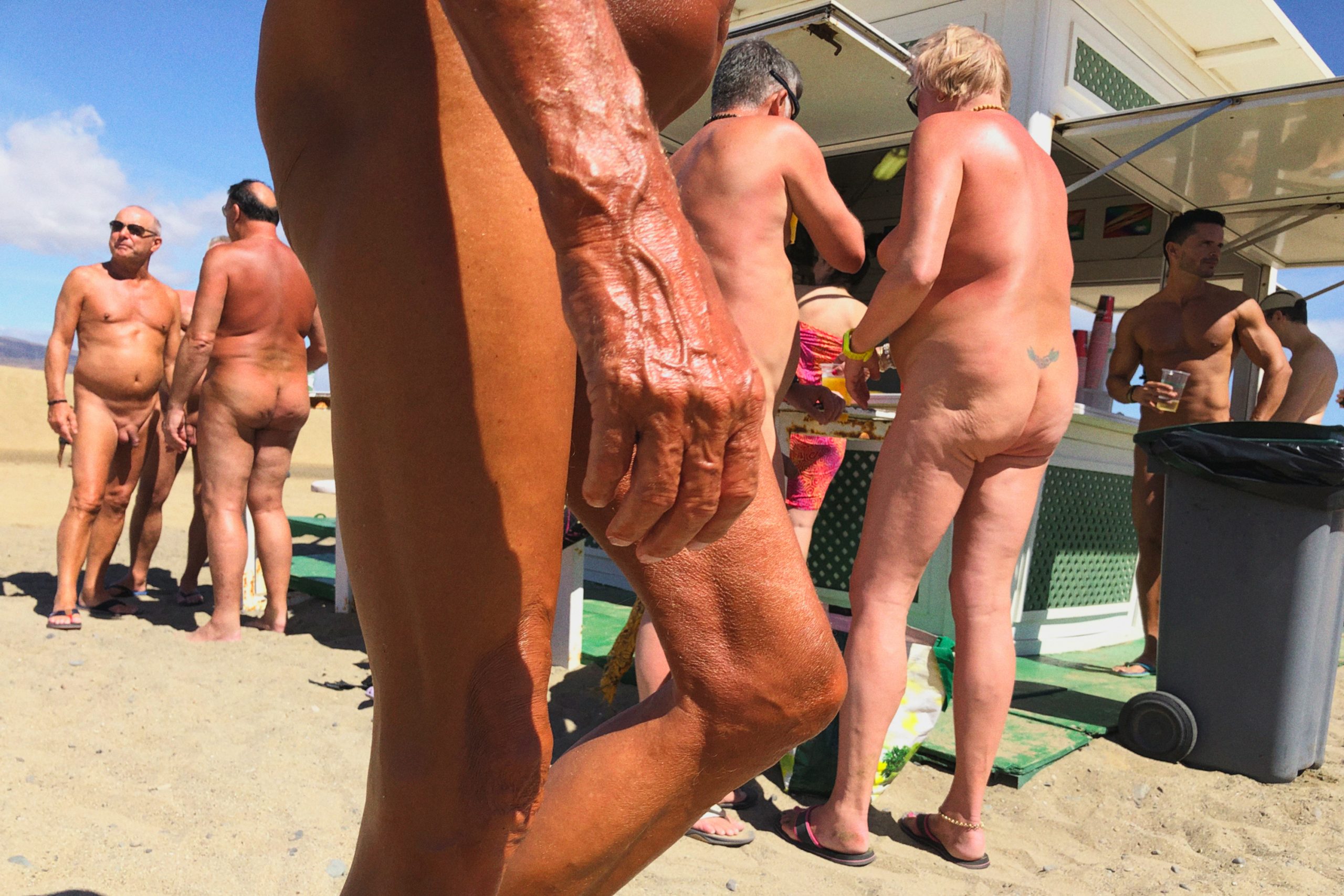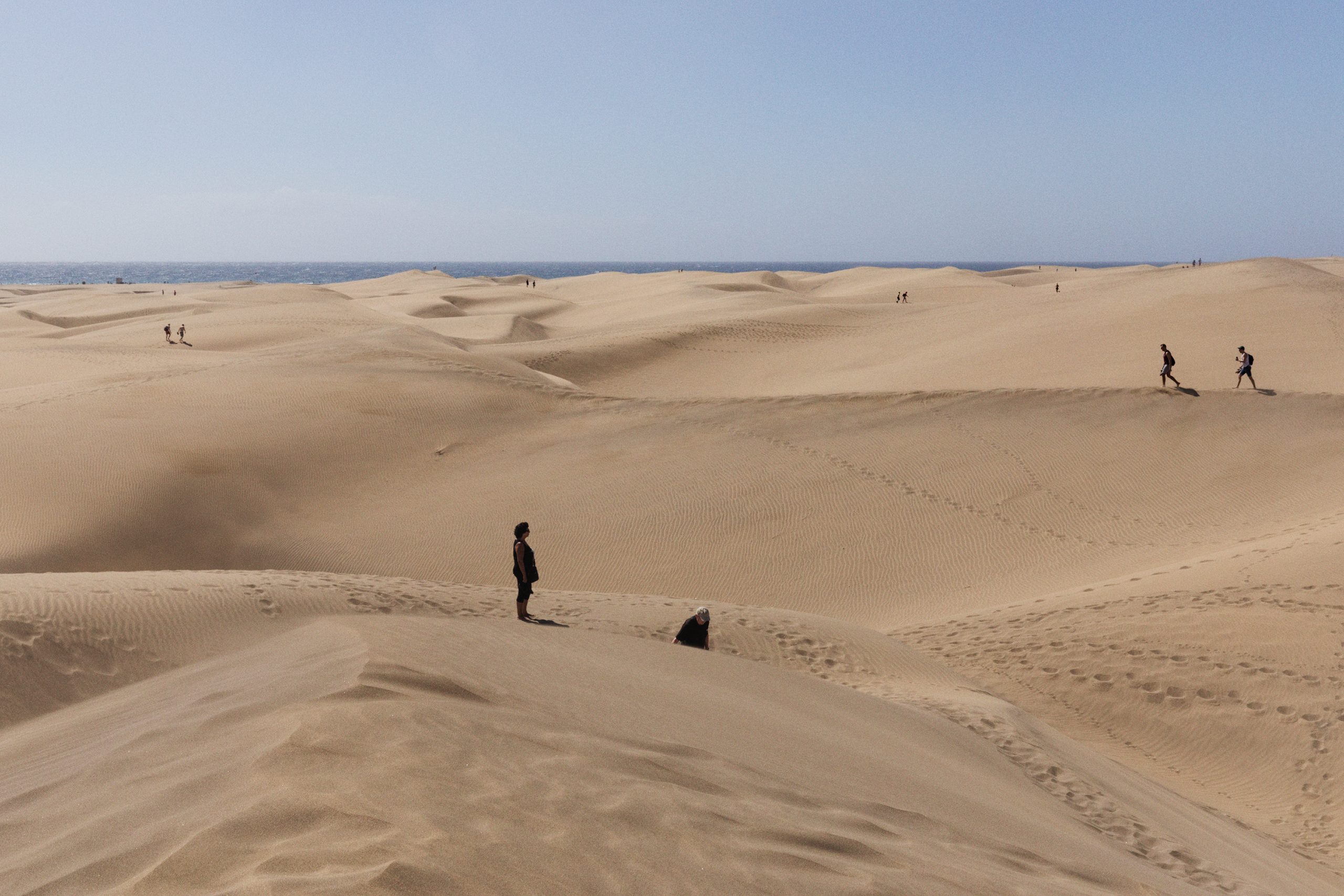Forlag: Disko Bay (København)
(THIS ARTICLE IS MACHINE TRANSLATED by Google from Norwegian)
Gran Canaria's dry sandbanks are spreading throughout the book Getaway first pages. Some recesses, it must be traces from the heads of the dromedaries, go across, while the people, two and two, zigzags on the hill tops, certainly to avoid rises. My eye follows the people in the photos, their gaze, wandering with them in an inverted Z, from the bottom up – reaching out into every corner of something that could be a parable, a fate story of the man of capitalism, the working animal.
At the far end of the horizon, the blue sea, the rolling waves and the spray of foam, the target of humans, the object of their desires can be seen. And on the route out there are no oases, only dunes under the rising sun.
Life, a desert walk. A quest for holidays, interruption of work and utility thinking, rationalization and productivity.
Cut to the next scene: photo # 2 in the photo story Getaway. We arrived, near a beach bar near the sea, here are beer mugs, bare ass and flippers, curvy backs and hairy arms. Bad copies.
Later, people are seen sleeping lazily on loungers, towels or just sand, exposing their tacky nature, hammocks, aging breasts, relaxing penises and clenched eyes. The bodies are informal and without posture, loose in the flesh or played out, the skin wrinkles and is sun-red or pale. In some cases varicose veins on the legs are considered.
The people here on the island pretend to be true, a single in the very literal sense – they capitulate, give the damn in the vanity of youth and let nature go its way. The entropy increases with age, the decay seems indispensable, and the portraits have fallen away with it.

White Male Nostalgia?
Behind the Photo Documentary Book Getaway stand five talented photographers who have their daily work at the photo agency Office Jantzen, and the purpose of the book has been to examine the Westerner who he or she is when he or she "enjoys, dreams, flees and recovers".
There is something «White Male Nostalgia» over the rhetoric. Photographers parody travel agency sales texts when they promise in the press release that the island (a metonymy for human on the island) will love visitors "quickly and unconditionally". On Gran Canaria is the love "mutual and generous" – the island is a place for the so-called incels, a time pocket where old-fashioned white men can escape the involuntary celibacy.
Normally, excluded white men would go east to Asia for their longings, while white women would go Africa like cougars. It witnesses dating sites and a Danish podcast series like The Gambian Farm about: The white men are looking for small, benevolent women who will submit to their "master's" wishes. The white women are seeking big, uplifting men without scruples, protective alpha males, who seem undisturbed by feminism. European conversation, on the other hand, does not want any of them. And now they can just fly to Gran Canaria.
However, there is a discrepancy between the text and the photographs. Of course, there is something about the sentiment of Europeans that Europeans like to travel far to feel. But sexuality is not much of it, rather the heavy, energy-intensive and sexually inactive bodies are portrayed – they are "naked", but they are not nudes the bodies do not matter. And in that way, the destination is well-chosen. The volcanic crater on the island, like one of the portrayed men's piercings in the scrotum beneath the limp and shadowy penis, is a testimony to the activity of the past.

Lone Wolves and Mountain Women
The book is made up mostly of photographs of people (alone, in pairs or in groups), nature pictures and grocery stores, and this page arrangement is a cause for a fruitful wonder.

Of course, there is a contrast between nature and the grocery stores: from the raw, unprocessed and thirsty nature to the finished product, ordered and available, supplied by well-known soft drink manufacturers like Coca-Cola.
In the anthropocene period that is ours, we have really got hold of the globe; a global flow of goods makes “the stranger” seem domestic. Nature "out there", the wild, seems in many places reduced to an expansive experience space, an exception that we no longer have to rid ourselves of, but liberate from ourselves through "rewilding". And in Gran Canaria you can have both worlds, taste the "wild" without really compromising comfort.
- ALSO READ: Nature's self-regulating mechanisms
The nudity
Another theme of the book is the nudity. In naturist environments, people like to talk about "undressing" as an exercise in putting aside their visual persona and leveling social divisions. We are undressed without the clothes as a social marker, we undress the cultural codes, return to a kind of pre-modern state without social markings and have to talk to people to know them. And from that perspective, the title is well chosen – for the portraits the journey to Gran Canaria is one getaway, the guests are freed from everyday class stigmata, and the loners, the lone wolves, can hide in the dry vegetation, find their true nature, root for a while.
The women and the mountains
One last interesting thing is that the book also uses metaphors drawn from the local community. On one side are two women lying on sunbeds, on the next two elongated mountains. The hilly theme goes again, the course of the arches, and the juxtaposition of women and mountains make me draw parallels, to think of them as metaphors for each other: Like the mountains, women are a piece of nature, the coupling is well known, also an old painter like Albrecht Dürer matched the woman with the wild, whimsical nature in the background. But here it is not just traits like the changeable temperament and the horizontally unapproachable (bedridden), the lazy wastefulness that goes again. The neglected and aging also play a role. The woman, as a comparator, determines what properties we emphasize in the mountains and, conversely, different theses are tested, it must make sense. And here, too, "the transient" is a theme: Erosion furrows the mountains over time, just as old age wrinkles humans.
Forget all the illusions of man's eternal youth and omnipotence. As mountains we are.
The book can be ordered directly from publisher Disko Bay.


